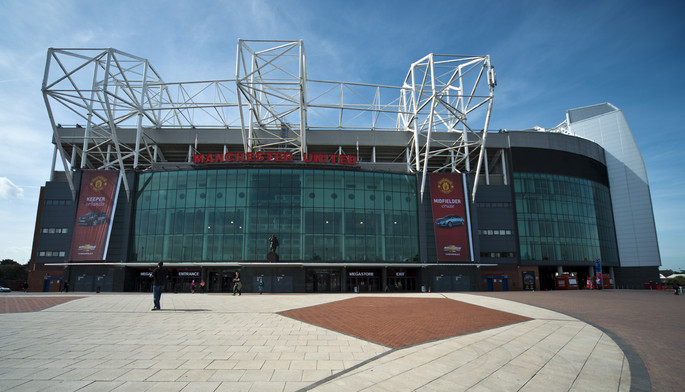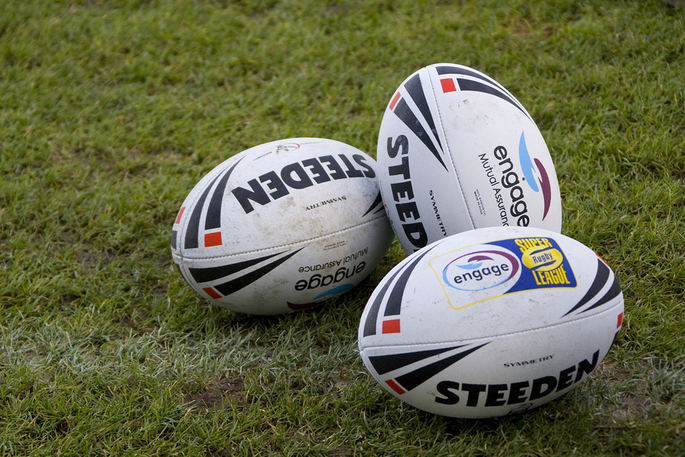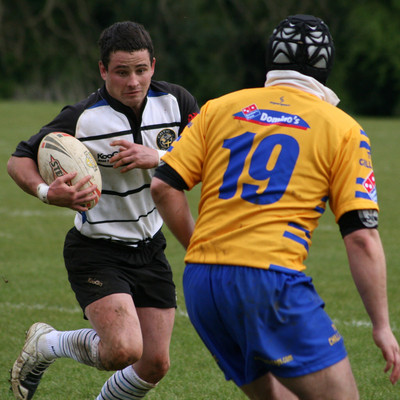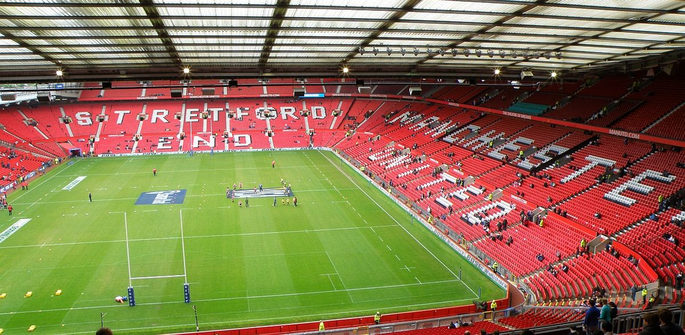Fast Facts
- When: 15th February to 12th October 2024
- Where: Various, Grand Final at Old Trafford, Manchester
- Watch: Sky Sports & BBC
- Official Website: Betfred Super League
This season will be the 29th running of the Super League, the 27th to be decided with the Grand Final.
The Grand Final is the climax to Rugby League’s Super League season and is usually held each October at Manchester United’s Old Trafford Stadium. The two finalists will have battled through a 27-game regular season and the playoffs to get the chance to lift the Super League Trophy and be crowned champions.
St Helens are the Grand Final’s most successful side with nine victories, followed by Leeds Rhinos with eight, Wigan Warriors with six and the Bradford Bulls with three final wins. The unluckiest side is arguably Warrington Wolves who have been in four finals but are yet to lift the trophy.
Existing Customer Free Bets & Money Back Offers
Place a pre-match single on the first tryscorer in selected Super League games you could get double the odds if they score the first then get a second try. The winnings for this will be paid in cash.
For all Rugby League and Rugby Union matches that go into extra time at bet365. Applies to pre-match bets placed on full-time and second half markets.
Stats Articles
Event Stats
Super League Grand Finals – 1998 to 2023
| Year | Champions | Score | Runner-up |
|---|---|---|---|
| 2023 | Wigan Warriors | 10-2 | Catalans Dragons |
| 2022 | St Helens | 24-12 | Leeds Rhinos |
| 2021 | St Helens | 12-10 | Catalans Dragons |
| 2020 | St Helens | 8-4 | Wigan Warriors |
| 2019 | St Helens | 23-6 | Salford Red Devils |
| 2018 | Wigan Warriors | 12-4 | Warrington Wolves |
| 2017 | Leeds Rhinos | 24-6 | Castleford Tigers |
| 2016 | Wigan Warriors | 12-6 | Warrington Wolves |
| 2015 | Leeds Rhinos | 22-20 | Wigan Warriors |
| 2014 | St Helens | 14-6 | Wigan Warriors |
| 2013 | Wigan Warriors | 30-16 | Warrington Wolves |
| 2012 | Leeds Rhinos | 26-18 | Warrington Wolves |
| 2011 | Leeds Rhinos | 32-16 | St Helens |
| 2010 | Wigan Warriors | 22-10 | St Helens |
| 2009 | Leeds Rhinos | 18-10 | St Helens |
| 2008 | Leeds Rhinos | 24-16 | St Helens |
| 2007 | Leeds Rhinos | 33-6 | St Helens |
| 2006 | St Helens | 26-4 | Hull FC |
| 2005 | Bradford Bulls | 15-6 | Leeds Rhinos |
| 2004 | Leeds Rhinos | 16-8 | Bradford Bulls |
| 2003 | Bradford Bulls | 25-12 | Wigan Warriors |
| 2002 | St Helens | 19-18 | Bradford Bulls |
| 2001 | Bradford Bulls | 37-6 | Wigan Warriors |
| 2000 | St Helens | 29-16 | Wigan Warriors |
| 1999 | St Helens | 8-6 | Bradford Bulls |
| 1998 | Wigan Warriors | 10-4 | Leeds Rhinos |
Schedule for the 2023 Season

Steve Collis, flickr
- Regular Season: Thursday 16th February to Friday 20th September 2024
- Rivals Weekend: Thursday 28th to Sunday 31st March 2024
- Magic Weekend (Elland Road, Leeds): Saturday 17th & Sunday 18th August 2024
- Play-Offs: Friday 27th September to Saturday 5th October 2024
- Grand Final (Old Trafford, Manchester): Saturday 12th October 2024, kick-off TBC
About The Super League

The Super League Grand Final is, as the name suggests, the final match of rugby league’s Super League tournament. It first occurred in 1998 and is the match-off between the two sides that qualified via the Play-Off Series of the Super League.
Super League Formation
In order to understand the Grand Final of the Super League you first need to know about the competition itself. We’re not going to go into the split between rugby league and rugby union here, but sufficed to say that this tournament is only relevant to the league side of the sport.
The Super League began in 1996 when the Rugby Football League Championship was disbanded, and the tournament moved from being a winter game to a summer one. In actual fact, the idea behind a so-called ‘super league’ was first suggested during what is known as the Australian Super League War, when the broadcaster Rupert Murdoch was looking to gain the upper hand during negotiations with the Australian Rugby League over broadcasting rights.
It was during that period that Murdoch approached the owners of British rugby league clubs and discussed the possibility of starting a British Super League, agreeing to pay each of the founding teams a large sum of money. The first twelve teams involved in the tournament were as follows:
Original 12 Super League Clubs
| Team | Founded | Home Stadium | Division in 2024 |
|---|---|---|---|
| Bradford Bulls | 1907 | Odsal Stadium | RFL Championship |
| Castleford Tigers | 1926 | Wheldon Road | Super League |
| Halifax Blue Sox | 1873 | Thrum Hall | RFL Championship |
| Leeds Rhinos | 1870 | Headingly Stadium | Super League |
| London Broncos | 1980 | The Valley, Charlton | Super League |
| Oldham Bears | 1876 | Watersheddings | RFL League 1 |
| Paris Saint-Germain | 1995 | Stade Sebastien Charlety | Dissolved |
| Sheffield Eagles | 1984 | Don Valley Stadium | RFL Championship |
| St. Helens | 1873 | Knowsley Road | Super League |
| Warrington Wolves | 1876 | Wilderspool Stadium | Super League |
| Wigan Warriors | 1872 | Central Park | Super League |
| Workington Town | 1945 | Derwent Park | RFL League 1 |
To begin with there was a suggestion that some of the clubs could merge in order to strengthen the nature of the competition, but this was rejected on account of it being such an unpopular idea. Instead, only existing clubs were invited to take part in the tournament, whilst two sides were given special dispensation to join the tournament for commercial reasons. The London Broncos had finished fourth in the Second Division of the Championship the year before and were fast-tracked into the new league order to ensure that the capital had a representative, whilst Paris Saint-Germain was created especially to have a French club as part of the new competition.
System Changes & Licensing

The Super League’s first season began in 1998 and for the first two years of its existence there was no relegation for the teams that were involved in it. That changed after the turn of the millennium, when Paris were dropped out of the tournament and promotion between the Super League and the National Leagues was introduced. In 2006 Catalans Dragons, a French side from the Perpignan district, became the second non-English team to take part in the Super League. It was known in advance that the French club was going to join, so the end of the 2005 campaign saw two clubs relegated out of the Super League and only one gaining promotion.
2005 was also an important year for the Super League because it was when the RFL announced that new considerations would be made in terms of deciding which clubs were going to take part in the competition from 2009 onwards. Licences would be awarded to teams according to more than just how well the side were playing on the pitch, with four main criteria being considered:
- Stadium Facilities
- Finance and Business Performance
- Commercial and Marketing
- Playing Strength, Including Junior Development and Production
The successful teams would receive a licence to partake in the Super League for three years, with three-yearly reviews of membership of the Super League occurring in order to ensure that clubs from further down the league system that were ambitious could still gain success. Each club’s application would be given a series of points and those points would then become a licence with an A, B or C grade. A and B licensees were automatically moved into the Super League, whilst those with a C licence were scrutinised further by the RFL in order to decide which ones should also be allowed to play in the top-flight.
The League’s Expansion & Contraction

In 2008 the Rugby Football League announced that it would be expanding the Super League to allow in fourteen teams rather than the twelve that had taken part in it previously. Joining the twelve pre-existing Super League teams for the 2009 season would be the Celtic Crusaders and Salford from National League 1. The Crusaders not only became the first Welsh side to play in the Super League but were also the first side to be awarded a licence despite not having been a Super League club beforehand.
The Annual General Meeting in Bradford in 2013 saw the Super League clubs agree to abandon the short-lived expansion to fourteen teams for the 2015 season, at the same time that there would be a return of the promotion and relegation system with the twelve club Championship.
Regular Season in 2024
The twelve teams of the Super League will play each other at least once at home and once away, with the Magic Weekend an additional round played mid-season. A grading system will be implemented as of 2025 meaning that the bottom placed team won’t automatically be relegated to the Championship in 2024.
2024 Super League Teams (XXIX)
| Team | Stadium | Location | Head Coach |
|---|---|---|---|
| Castleford Tigers | The Jungle | West Yorkshire | Craig Lingard |
| Catalans Dragons | Stade Gilbert Brutus | Perpignan, France | Steve McNamara |
| Huddersfield Giants | Kirklees Stadium | West Yorkshire | Ian Watson |
| Hull F.C. | MKM Stadium | East Riding of Yorks | Tony Smith |
| Hull Kingston Rovers | Craven Park | East Riding of Yorks | Willie Peters |
| Leeds Rhinos | Headingley | West Yorkshire | Rohan Smith |
| Leigh Leopards | Leigh Sports Village | Greater Manchester | Adrian Lam |
| London Broncos | Plough Lane | London | Mike Eccles |
| Salford Red Devils | Salford Community Stadium | Greater Manchester | Paul Rowley |
| St Helens | Totally Wicked Stadium | Merseyside | Paul Wellens |
| Warrington Wolves | Halliwell Jones Stadium | Cheshire | Sam Burgess |
| Wigan Warriors | DW Stadium | Greater Manchester | Matt Peet |
In order to add to the sense of confusion about how the Super League works, all twelve clubs will play 25 regular season games which include a ‘Rivals Round’ played over Easter weekend.
At the end of the twenty-five games the team that finishes bottom of the Super League is awarded the Wooden Spoon and the one that finishes top receives the League Leaders Shield. More importantly, at least as far as this piece is concerned, is the fact that the top six placed teams all enter into a playoff system.
Super League Play-Offs in 2024
The 2024 format sees the top two ranked teams in the league going straight to the Semi-Finals, with the other four competing in an elimination round.
Play-Off Match Format
| Round | Game | Team 1 | Team 2 | |
|---|---|---|---|---|
| 1 | Eliminator 1 | 3rd in table | v | 6th in table |
| Eliminator 2 | 4th in table | v | 5th in table | |
| 2 | 1st Semi-Final | 1st in table | v | Lowest ranked Eliminator winner |
| 2nd Semi-Final | 2nd in table | v | Highest ranked Eliminator winner | |
| 3 | Grand Final | Winner 1st Semi-Final 1 | v | Winner 2nd Semi-Final |
Perhaps more interesting is the fact that the play-off model between 2019 and 2020 was used by the New South Wales Rugby League when it ran the Sydney Cup between 1973 and 1994, as well as the Australian Super League in 1997 and the Victorian Football League in Australia between 1972 and 1990. Both the Lion Red Cup of New Zealand of 1994-1996 and the same country’s Bartercard Cup also used a similar play-off system. It remains to be seen whether the Super League return to this format in the future.
Season Format Prior to 2019
The regular season previously saw each team play each other once both home and away, plus an extra fixture in what is known as the Magic Weekend. This is where entire round of the competition takes place at a single venue over one weekend in May with each side playing in one of six fixtures.
After a vote between the member teams, there was a change to the format as of the 2019 season, with the Super 8s scrapped altogether.
Super 8’s
After these games had been completed, the league then split. The top 8 sides had their points carried over and played each other once more. After these fixtures had been completed the team at the top was awarded the League Leaders Shield. The top four teams progressed to the play-offs to decide who went through to the Grand Final.
The bottom four teams joined with the top four teams from Rugby League’s second division, The Championship, in what was known as the Rugby League Qualifiers. Here each side also played each other once over seven fixtures. After this point, the top three played in next season’s Super League. The fourth and fifth placed sides then took part in a one off match to decide who would be the final Super League team, this was known as The Million Pound Game.
Play-Offs
The play-off system employed in the Super League has been through numerous different iterations. Prior to the 2019 changes, after the Super 8s had been completed, the first and fourth teams in the league played in one semi-final, whilst the second and third contested the other. Home advantage went to the side who finished highest with the two victors progressing to the Grand Final.
Grand Final Venue

Since the Super League Grand Final first took place in 1998, the match has taken place at Old Trafford in Manchester, with the exception of the 2020 Final at Hulls KCOM Stadium. The venue is not as well-known for its association with the sport of rugby as it is as the home of the Premier League club Manchester United. It opened its doors for the first time in 1910 and was designed by the famed sports architect Archibald Leitch, undergoing numerous expansions in the 1990s and 2000s to see it arrive at a capacity of in excess of seventy-four thousand.
Whilst football will forever be the sport that is most closely associated with the stadium, it has been used for other sports before the ground was even built. It was a venue for the game of shinty, a traditional sport of the Scottish Highlands, as well as for baseball during World War One. The first time that rugby was played on the turf was in the 1924-1925 campaign when a side representing Lancashire took on the New Zealand national side. This fact was reflected when Old Trafford was chosen as a venue for the Rugby League World Cup when the competition was jointly hosted by Great Britain, France and Ireland in 2000.
Interesting Facts
The Super League Play-Off Final, which is better known as the Grand Final, are invited to pay against the winner of the National Rugby League in the World Club Challenge, with the runner-up of the Grand Final taking the spot if the same team wins both. Perhaps even more noteworthy, especially for the winning team, is the fact that the players each get a ring and the name of the winning team as well as the captain and the year is engraved on the Super League Trophy. The winners also receive £100,000, whilst the losing side collects £50,000.
The best player during the game receives the Harry Sunderland Trophy, which is decided by the Rugby League Writers’ Association and is named in honour of a former rugby league administrator in both Australia and the UK who died in 1964.
A team that both wins the Challenge Cup at the end of the regular season and then wins the Grand Final is said to have ‘done the Double’, which doesn’t happen as often as you might assume. It is also possible for a side to do the ‘Treble’; something achieved by winning the Challenge Cup, the League Leaders’ Shield and the Grand Final. Lastly on that front, there is the possibility to win the League Leaders’ Shield, the Grand Final, the Challenge Cup and the World Club Challenge, though not all four trophies have been available at the same time.
There are other interesting facts worthy of mentioning, of course, with the following being the standout ones:
- The first Grand Final winning side was Wigan, beating Leeds 10-4 in 1998
- As of 2023, St Helens have the most appearances in the Grand Final with fourteen
- St Helens have won the Grand Final more than any other team with nine trophies
- Wigan have won the Double on seven occasions, more than any other side
- Despite being the second most successful team in the Grand Final, Leeds Rhinos have only won the Double once
- Oasis, Madness, Deacon Blue and Scouting for Girls have all been the pre-match headliners before the Grand Final
